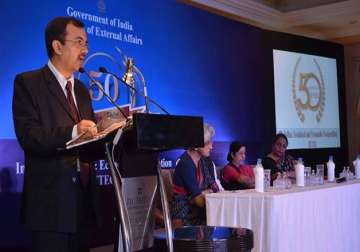India's developmental partnership outreach going digital
New Delhi:It is India's most understated diplomatic outreach, yet the one with the highest global demand and most impact. And now, the government's Indian Technical and Economic Cooperation (ITEC) partnership programme covering over 160 countries
New Delhi:It is India's most understated diplomatic outreach, yet the one with the highest global demand and most impact. And now, the government's Indian Technical and Economic Cooperation (ITEC) partnership programme covering over 160 countries is set to launch its own dynamic digital platform, giving it wider reach and access.
The popularity of the ITEC programme, through which India shares its developmental experience gathered over the decades with other developing countries, can be gauged from the simple fact that in the 50 years since its launch in l964, when it began with capacity building training to 100 officials of various countries, over 10,000 scholarship slots have been disbursed so far. And the demand for the ITEC slots is ever growing from developing countries.
"This year we are celebrating the 50th year anniversary of ITEC. We are going to roll out a new dynamic ITEC portal, a completely renovated portal, that will keep all ITEC member countries, the alumni, the Indian missions, all connected. It is an ambitious programme," Kumar Tuhin, Joint Secretary in the Ministry of External Affairs' Development Partnership II wing, who looks after ITEC, told IANS.
The new ITEC portal is in keeping with Prime Minister Narendra Modi's Digital India drive, he added.
"The portal will help the alumni (those who attended ITEC courses) to stay in touch with each other while those undergoing capacity building can keep in touch with fellow course mates or with those in different courses," he added.
"The new format for applying for ITEC scholarships would be less burdensome for the Indian missions. The applicant would also be able to track the status of his or her application through an email login, which would be validated," said Tuhin.
Once the official has completed the course, the portal would recognize him or her as an alumnus. The people can also give their feedback or comments regularly through the portal.
"It will be a way to stay in touch with the Indian missions, with colleagues, the alumni and the institutes for life," Tuhin added.
ITEC Day is celebrated every year on September 15, when the Indian missions in the partner countries host a reception for the participating officials as well as alumni who share their experiences.
The ITEC programme, part of South-South cooperation, provides training to build capacity in areas like IT, English language, telecommunications and agricultural research - among 284 courses on offer through over 40 chosen institutes in India.
It is a demand-driven initiative, with the Indian government receiving requests from countries to conduct capacity building training in different spheres. The newer fields that are in demand are forensic sciences and cyber crime; but Information Technology is by far the most sought after, he said.
Tuhin says the capacity building conducted under ITEC and its corollary SCAAP (Special Commonwealth Assistance for Africa Programme) and the Technical Cooperation Scheme of Colombo Plan, is "streamlined and smooth, but under the radar".
"The developmental partnership through ITEC is steady, constant, there is no high visibility. But it gives India maximum goodwill, and there is always positive feedback," Tuhin added.
The ITEC development partnership, spread across countries in Asia, East Europe, Central Asia, Africa and Latin America, has helped India build up a steady and strong reputation among the partner countries as a provider of technical know-how, expertise and training in a variety of subjects.
The popularity of the programme can be gauged from the fact that in the Seychelles, where Prime Minister Modi visited last week, over 1,000 people have attended capacity building training under ITEC out of the island's population of 90,000.
The Indian government fully funds the capacity building training, including the air fare, stay, teaching and also provides a kind of nominal stipend.
